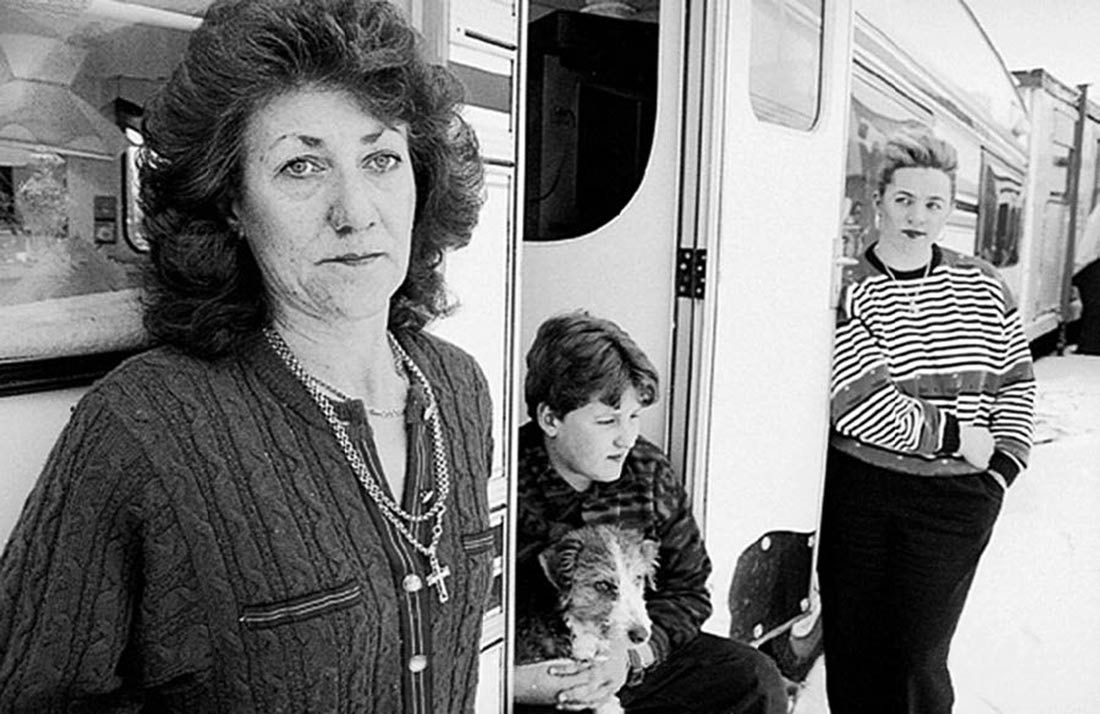
News and other Busyness
Scottish Travellers Go To Europe
Family accuse council of discrimination in planning dispute reports Annie Taylor.
Squall 15, Summer 1997, pg. 15.
A travelling family threatened with jail if they live on their own caravan site are taking their fight for the right occupy their land to the European Court.
The Lowthers bought a £120,000 caravan park just outside Kinross in central Scotland in 1991 and have been locked in a bitter struggle with their local council ever since. They believe that prejudice against Travellers lies behind the troubles they have faced and that the refusal to let them inhabit their land is a denial of their basic human rights.
When they bought the land they understood they could run a commercial caravan park on it according to consents granted in 1961 and 1979. They spent £80,000 on amenities and improvements to bring it up to licensing standard after threats of action from Perth and Kinross Council. The previous owners of the land had received no such warnings. Josephine Lowther remembers officials seemed pleased with the results and suggested they apply for planning permission just as a formality. But the application was rejected following objections from the same officials who had encouraged the Lowthers to invest heavily in the site.
Since 1992, the Lowthers have made four applications to keep caravans on the site, all unsuccessful.
When an enforcement notice came ordering them off the site, 18 vehicles had to be moved and the non-Travellers among the residents were given housing. The family lost their business and their home land. At first they resisted the ban but when Mrs Lowther and her daughter Tracey were threatened with jail or a £20,000 fine Mrs Lowther backed down for Tracey's sake.
Their vehicles are now parked defiantly on the roadside just outside the gates to their site. The family suspect the root of the problem is that the land does have planning permission attached to it, but for houses.
The matter eventually went before the former Scottish Secretary Michael Forsyth who dismissed the Lowthers' appeal in March. But in the notes of the proceedings it was recorded that:
"If sympathy for the appellant's predicament could be an overriding planning consideration, then the way would be clear for the permission that they seek... There is an obvious contrast between the intensity of enforcement action by the planning authorities since 1991 and the relative inactivity before then in regard to breaches of planning control."
The notes also state that the local authority's keeness to act against the Lowthers came once it realised that they did not intend to utilise the housing planning permission.
Since the inquiry ended, Mrs Lowther says she's been approached by three builders wanting to buy the land but despite her difficulties she remains resolute that it's not for sale.
"The fact that I am a Traveller makes it easy for them to threaten and harass us and make us move on," said Josephine. "But we must stand and try to get something done. Non-Travellers say to travelling poeple 'why don't you settle down and educate your children?' and when you do - wallop, you get the planners wanting you to move on. Travellers do like to move on but we are in this too far now to let it go. We shouldn't have to go to Europe to get justice but there is no protection for Travellers in this country."
